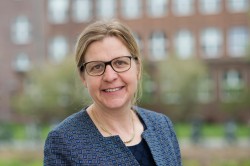Press Release, 14. January 2021
Bioeconomy Council elects two female leaders
UFZ professor Daniela Thrän is elected co-chair
On 11 January, the Bioeconomy Council, which was newly appointed by the German government in December 2020, transferred the chair of the advisory council to two outstanding female scientists: Prof. Dr. Daniela Thrän, a systems scientist at the Helmholtz Centre for Environmental Research (UFZ) and the German Biomass Research Centre (DBFZ), and Prof. Dr. Iris Lewandowski, a bioenergy expert at the University of Hohenheim.
The Federal Ministry of Education and Research (BMBF) and the Federal Ministry of Food and Agriculture (BMEL) appointed the members of the new Bioeconomy Council in December of last year. The expertise of the members spans the entire breadth of the bioeconomy and covers the areas of business, science and society. With Daniela Thrän and Iris Lewandowski, the 20-member council has now selected two female scientists from among its ranks to serve on its chair for the next three years.
"The bioeconomy is a fundamental building block of our future economic system. It is important to me to quickly and fully exploit the many and varied opportunities and innovation potential of bioeconomy, as they are urgently needed for sustainable development both in Germany and in the international arena," says Daniela Thrän. "The new Bioeconomy Council combines a unique body of expertise to support this transformation based on knowledge."
"With Prof. Daniela Thrän, an outstanding scientist and proven bioeconomy expert is moving to the head of this key advisory council in the German government. Her election to the chair serves to illustrate the importance now being attributed to science and research in the policy advisory area. For us at the UFZ, this is a further confirmation and recognition of our activities in knowledge transfer", enthuses Prof. Dr. Georg Teutsch, UFZ Scientific Managing Director. Most recently, microbiologist Prof. Dr. Katja Bühler was appointed to the National Hydrogen Council in January, and agricultural ecologist Prof. Dr. Josef Settele and environmental law expert Prof. Dr. Wolfgang Köck were appointed to the German Advisory Council on the Environment in June 2020.
Prof. Dr. Daniela Thrän is an environmental protection engineer. As a systems scientist, she conducts research on the effects of the sustainable use of renewable resources for energy and materials. She has headed the UFZ Department of Bioenergy since 2011 and is also the head of the "Bioenergy Systems" department at the German Biomass Research Centre (DBFZ) in Leipzig. She is also a spokesperson for the UFZ's integrated platform for sustainability transition. She chairs the Bioenergy Systems department at the University of Leipzig. Daniela Thrän is a member of numerous advisory councils on the German federal and state level, including the Bioeconomy Council since September 2012.
The BMBF and the BMEL first established a Bioeconomy Council as an advisory body to the German government in 2009. Its tasks included providing important input for the "National Research Strategy Bioeconomy 2030" and the "National Policy Strategy Bioeconomy". The German federal government adopted the National Bioeconomy strategy, bundling government bioeconomy policy activities, in January of 2009. The third Bioeconomy Council was appointed In December 2020 and consists of 20 experts from the areas of science, business and society. As an independent and neutral body, the Bioeconomy Council has the task of advising the German federal government on the implementation of the strategy with recommendations and position statements while simultaneously promoting public debate on the bioeconomy.
Further information
UFZ press office
Susanne Hufe
Phone: +49 341 6025-1630
presse@ufz.de
In the Helmholtz Centre for Environmental Research (UFZ), scientists conduct research into the causes and consequences of far-reaching environmental changes. Their areas of study cover water resources, ecosystems of the future, environmental technologies and biotechnologies, the effects of chemicals in the environment, modelling and social-scientific issues. The UFZ employs more than 1,100 staff at its sites in Leipzig, Halle and Magdeburg. It is funded by the Federal Government, Saxony and Saxony-Anhalt.
www.ufz.deThe Helmholtz Association contributes to solving major challenges facing society, science and the economy with top scientific achievements in six research fields: Energy; Earth and Environment; Health; Key Technologies; Matter; and Aeronautics, Space and Transport. With some 39,000 employees in 19 research centres, the Helmholtz Association is Germany’s largest scientific organisation.
www.helmholtz.de
